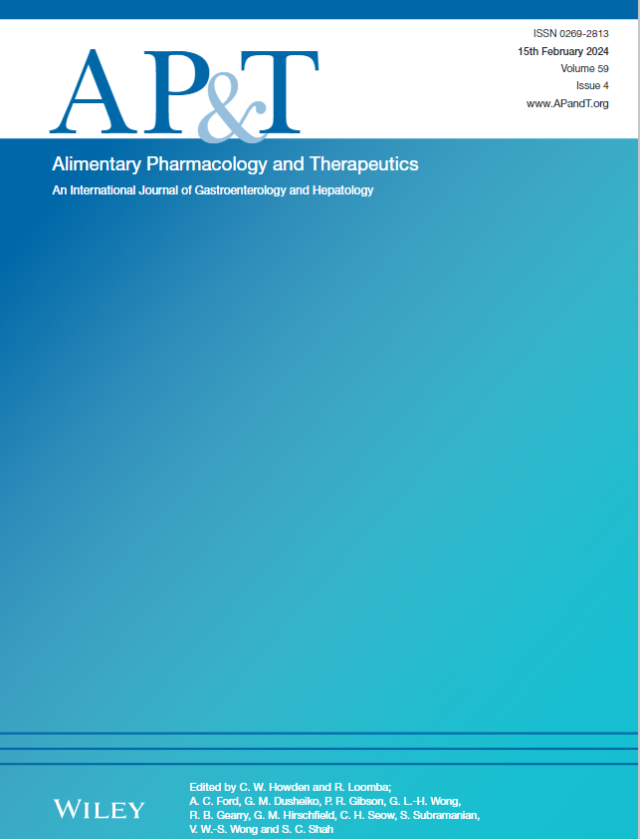Temporal Trends in Medical and Surgical Management of Ulcerative Colitis in England: 2003-2020.
IF 6.7
1区 医学
Q1 GASTROENTEROLOGY & HEPATOLOGY
引用次数: 0
Abstract
BACKGROUND The medical management of ulcerative colitis (UC) is evolving. However, colectomy may be required in severe or refractory cases. AIM To provide contemporary evidence on medication usage and surgery for UC. METHODS An incident cohort of patients newly diagnosed with UC from 2003 to 2020 was identified using computerised health records. The cumulative incidence of colectomy and medication use was calculated using Kaplan-Meier methods and compared across 3 time periods. We calculated 90-day post-operative mortality using life tables. Cox regression was used to model the risks of surgery and mortality, adjusting for confounders. RESULTS 39,198 subjects had an incident diagnosis of UC. 5-year cumulative incidence of elective colectomy reduced from 2.60% to 1.30%, and emergency colectomy from 3.27% to 2.27% from 2003-2007 to 2015-2020. For elective surgery, adjusted hazard ratio (aHR) 0.44 and for emergency surgery, aHR 0.58 when 2015-2020 was compared to 2003-2007. Colectomy was less likely in women (elective aHR 0.74, emergency aHR 0.71) and emergency colectomy was less likely in those aged 40-59, aHR 0.86 than in those aged 18-39. Ninety-day mortality for elective and emergency surgery was 1.58% and 4.21%, respectively. Use of advanced therapies increased from 2% to 16% at 5 years from diagnosis when comparing 2003-2007 and 2015-2020. CONCLUSION Colectomy in the five years following diagnosis has declined, coinciding with an increased use of advanced therapies. Overall post-operative mortality is low. While the indication for colectomy may influence the risk of adverse outcomes, aggregate data provide a reassuring picture of current practice.英国溃疡性结肠炎内科和外科治疗的时间趋势:2003-2020。
背景溃疡性结肠炎(UC)的医疗管理正在不断发展。然而,严重或难治性病例可能需要结肠切除术。目的:为UC的药物使用和手术提供当代证据。方法使用计算机健康记录确定2003年至2020年新诊断为UC的患者的事件队列。使用Kaplan-Meier方法计算结肠切除术和药物使用的累积发生率,并对3个时间段进行比较。我们使用生命表计算术后90天死亡率。采用Cox回归对手术风险和死亡率进行建模,并对混杂因素进行调整。结果39,198例被诊断为UC。从2003-2007年到2015-2020年,择期结肠切除术的5年累积发生率从2.60%降至1.30%,急诊结肠切除术从3.27%降至2.27%。与2003-2007年相比,2015-2020年择期手术的调整风险比(aHR)为0.44,急诊手术的调整风险比为0.58。女性结肠切除术的可能性较小(选择性aHR为0.74,紧急aHR为0.71),40-59岁的女性紧急结肠切除术的可能性较小,aHR为0.86,低于18-39岁的女性。选择性和紧急手术的90天死亡率分别为1.58%和4.21%。与2003-2007年和2015-2020年相比,先进疗法的使用在诊断后5年从2%增加到16%。结论结肠切除术在诊断后的5年内有所下降,与先进治疗方法的使用增加相一致。总体术后死亡率较低。虽然结肠切除术的适应症可能会影响不良后果的风险,但总体数据提供了当前实践的可靠图景。
本文章由计算机程序翻译,如有差异,请以英文原文为准。
求助全文
约1分钟内获得全文
求助全文
来源期刊
CiteScore
15.60
自引率
7.90%
发文量
527
审稿时长
3-6 weeks
期刊介绍:
Alimentary Pharmacology & Therapeutics is a global pharmacology journal focused on the impact of drugs on the human gastrointestinal and hepato-biliary systems. It covers a diverse range of topics, often with immediate clinical relevance to its readership.

 求助内容:
求助内容: 应助结果提醒方式:
应助结果提醒方式:


